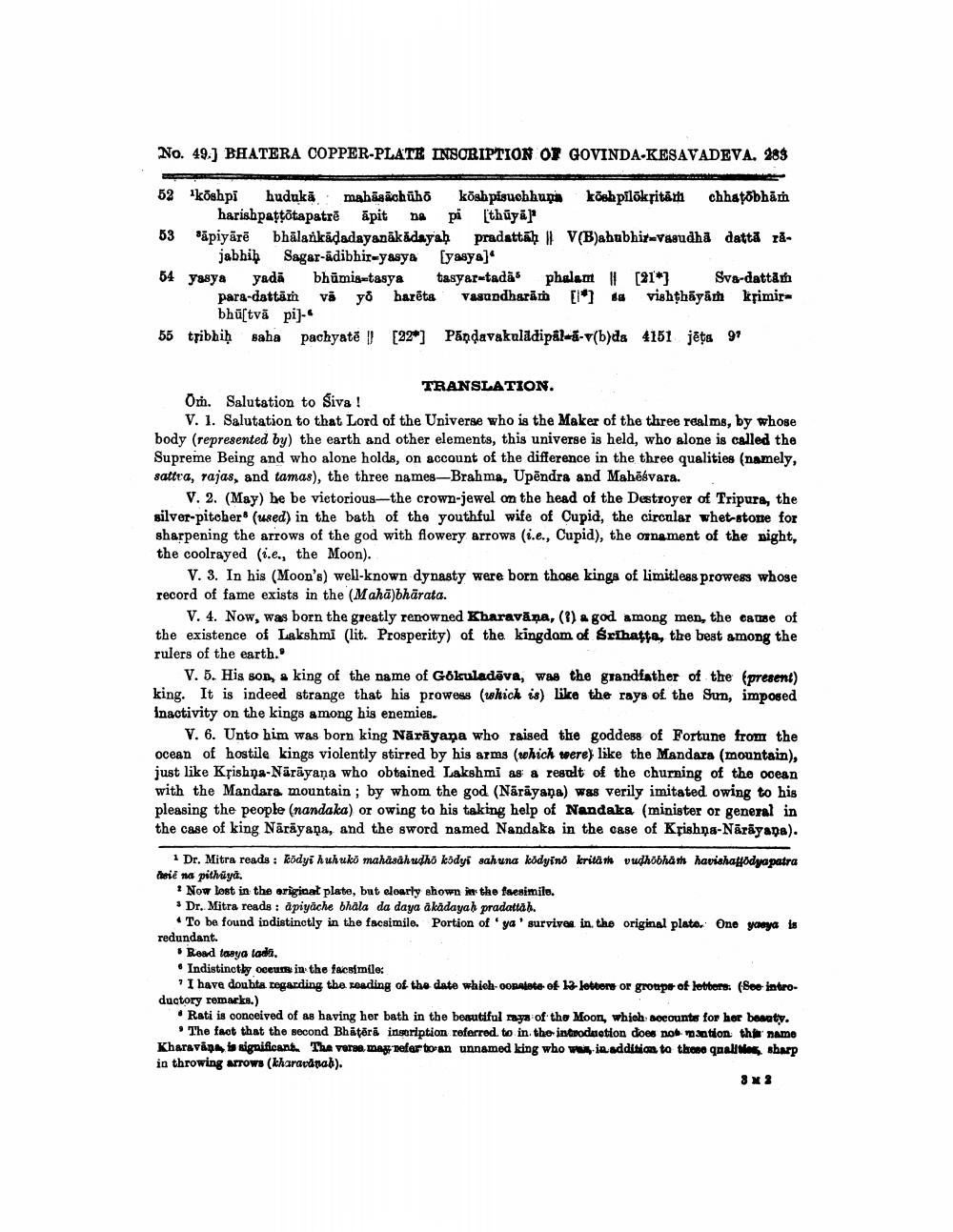________________
No. 49.) BHATERA COPPER-PLATE INSCRIPTION OF GOVINDA-KESAVADEVA, 283
ASSESSE
52 köshpi hudukā mahāsāchūho kosh pisuchhuņi kõshpilökritām chhagðbhāṁ
harishpaţtotapatré ápit pi [thūyal 63 Sāpiyārē bhālarkādadayanākādayaḥ pradattah # V(B)abubhitzVasudha datta rå
jabhih Sagar-adibhir-yasya (yasya]" 54 yasya yadā bhūmisetasya tasyar-tadās phalam | [31*) Sva-dattan
para-dattām và y barēta vasundharām [1] da vishthāyānh kipimir
bhūstvā pi). 56 tạibhiḥ saha pachyatē ! [22] Pāndavakaladipil-5-v(b)da 4151 jēga 97
TRANSLATION. Om. Salutation to Siva !
V. 1. Salutation to that Lord of the Universe who is the Maker of the three realms, by whose body (represented by) the earth and other elements, this universe is held, who alone is called the Supreme Being and who alone holds, on account of the difference in the three qualities (namely, sattra, rajas, and tamas), the three names-Brahma, Upendra and Mahēšvara. .
V. 2. (May) be be vietorious—the crown-jewel on the head of the Destroyer of Tripura, the silver-pitcher (used) in the bath of the youthful wife of Cupid, the circular whet-stone for sharpening the arrows of the god with flowery arrows (i.e., Cupid), the ornament of the night, the coolrayed (i.e., the Moon).
V. 3. In his (Moon's) well-known dynasty were born those kings of limitless prowess whose record of fame exists in the Maha)bhārata.
V. 4. Now, was born the greatly renowned Kharavāna, (?) A god among men, the cause of the existence of Lakshmi (lit. Prosperity) of the kingdom of Srlhatta, the best among the rulers of the earth.
V. 5. His son, king of the name of Gokuladēva, was the grandfather of the present) king. It is indeed strange that his prowess (which is) like the rays of the Sun, imposed Inactivity on the kings among his enemies.
V. 6. Unto him was born king Nārāyaṇa who raised the goddess of Fortune from the ocean of hostile kings violently stirred by his arms (which were) like the Mandara (mountain), just like Křishna-Nārāyana who obtained Lakshmi as a result of the churning of the ocean with the Mandars, mountain ; by whom the god (Nārāyana) was verily imitated owing to his pleasing the people (nandaka) or owing to his taking help of Nandaka (minister or general in the case of king Nārāyaṇa, and the sword named Nandaka in the case of Krishna-Nārāyana).
1 Dr. Mitra reads: ködyi huhuko mahäsähudho ködyi sahuna ködyino krität vudhobhath havishaffodya patra teie na pithūya.
? Now lost in the original plate, but clearly shown the facsimile. * Dr. Mitra reads: apiyāche bhala da daya akadayah pradattah.
• To be found indistinctly in the facsimile. Portion ofya' survived in the original plato. One yaaya to redundant.
* Read tasya ladi. • Indistinctly occurs in the facsimile:
I have doubta, regarding the roading of the date which-OOPALACE of 12 letter or group of letters: (Soe introductory remacka.)
• Rati is conceived of as having her bath in the beautiful raya of the Moon, which accounts for her beanty.
• The fact that the second Bhätora insoription referred to in the introduction does not mation th namo Kharavi to significant. The verae may, nefer to an unnamed king who was in addition to those qualities sharp in throwing arrows (lchararanab).




